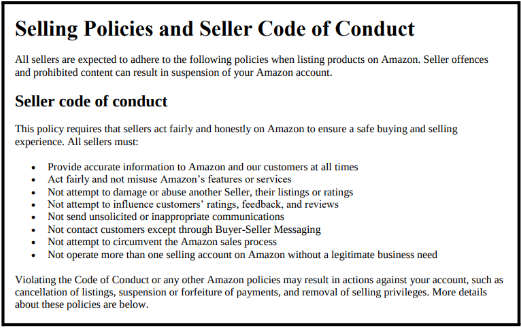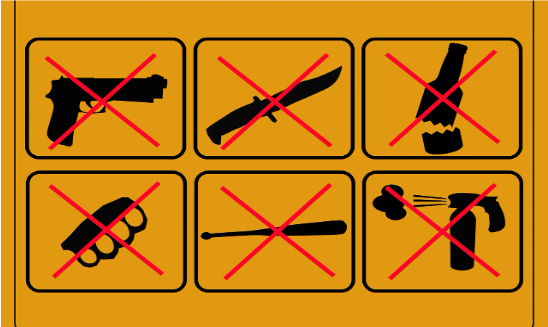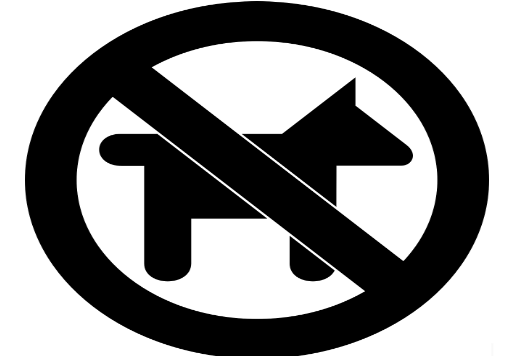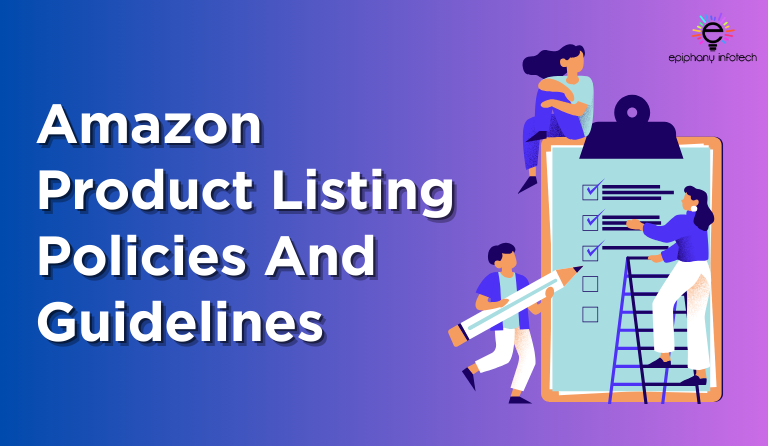TLDR;
Selling on Amazon requires adherence to the Seller Code of Conduct, accurate product listings, and compliance with policies. Prohibited products and restricted categories also exist, and sellers must ensure accurate categorisation and provide truthful information. Pricing should be competitive and comply with Amazon seller policies. Prohibited activities include sending unsolicited messages, offering incentives for reviews, and violating intellectual property rights. Amazon Sellers must prioritize safety, compliance, and ethical practices, and stay updated on policy changes.
Introduction to Amazon Seller Policies and Seller Code of Conduct
To maintain a trustworthy and secure Amazon marketplace, all Amazon sellers are required to adhere to the following Amazon seller policies when listing products on Amazon. Violating these policies, including seller offences and prohibited content, may lead to the suspension of your Amazon seller account.
Seller Code of Conduct
This policy mandates that sellers conduct themselves fairly and honestly on Amazon, promoting a safe and positive buying and selling environment. Sellers are expected to:
- Provide accurate information to Amazon and customers consistently.
- Act ethically and avoid misusing Amazon’s features or services.
- Refrain from damaging or abusing other Amazon sellers, their listings, or ratings.
- Avoid attempting to manipulate customers’ ratings, feedback, and reviews.
- Refrain from sending unsolicited or inappropriate communications.
- Only contact customers through Buyer-Seller Messaging.
- Avoid attempting to circumvent the Amazon sales process.
- Operate no more than one selling account on Amazon without a legitimate business need.
Violating the Code of Conduct or any other Amazon policies may result in actions against your account, including the cancellation of listings, suspension or forfeiture of payments, and removal of selling privileges. Further details about these policies can be found below.

Source: Amazon.com
Understanding Amazon Prohibited Products And Amazon Restricted Categories
After choosing a selling plan on Amazon, sellers need to follow the guidelines and Amazon seller policies to sell products on Amazon. For listing products on Amazon, understanding the platform’s intricate web of product restrictions is crucial for success. Certain categories are entirely off-limits, while others require specific approvals and adherence to strict safety and compliance guidelines. This guide aims to demystify these restrictions, highlighting prohibited products and restricted categories while emphasizing the importance of safety and compliance.
Amazon Prohibited Products
Certain products pose inherent risks or violate legal regulations, leading to an outright ban, to sell on Amazon. These include the following:
Hazardous materials: Explosives, flammable liquids, compressed gases, and other items deemed dangerous for transportation or storage. So these types of products are also prohibited to sell on Amazon.
Illegal items: Narcotics, weapons, counterfeit goods, and products violating intellectual property rights, So Amazon sellers are not allowed to list these products in the Amazon marketplace.

Medically regulated products: Prescription drugs, medical devices, and specific supplements require extensive approvals and licenses to sell on Amazon.
Restricted living animals and plants: Amazon heavily restricts the sale of live animals and plants due to ethical and ecological concerns.

Restricted Amazon Products: Tread Carefully
While not entirely banned, these products demand additional steps and approvals before selling on Amazon:
Food and beverages: For these Amazon product categories, specific requirements exist for labelling, ingredients, and safety certifications to sell on Amazon.
Cosmetics and personal care products: Compliance with safety regulations and ingredient restrictions is mandatory for cosmetics and personal care products to be sold on Amazon.

Dietary supplements and herbal remedies: Stringent labelling and health claim restrictions apply.
Automotive and Powersports products: Only pre-approved Amazon sellers can list specific items due to safety concerns.
Now Let’s Deep Dive Into Amazon Seller Guidelines & Policies To List Product On Amazon
- Products Should be in the Correct Category and Accurately Described
- Ownership of Necessary Rights
- Truthful and Non-Misleading Listings
- Pricing and Promotions
- Customer Service
- Prohibited Activities to Sell on Amazon
- Additional Amazon Seller Policies
1. Products Should be in the Correct Category and Accurately Described:
- This guideline ensures that Amazon sellers categorize their products correctly. While listing products on Amazon, Placing products in the right category helps customers find what they are looking for more easily.
- Accurate descriptions are crucial to providing potential buyers with a clear understanding of the product’s features, specifications, and uses. Misleading categorization or inaccurate descriptions can lead to customer dissatisfaction and potential returns.

2. Ownership of Necessary Rights:
- Amazon Sellers are required to have the legal right to sell products on Amazon they list on. This includes holding intellectual property rights such as trademarks, copyrights, or patents for the products they offer.
- Ensuring ownership of necessary rights helps prevent issues related to intellectual property infringement. It also promotes fair competition and protects both Amazon sellers and customers.
3. Truthful and Non-Misleading Listings:
- Sellers are obligated to provide truthful and accurate information in their Amazon product listings. This includes details about the product’s condition, features, dimensions, and any other relevant information.
- Misleading information can lead to customer dissatisfaction and erode trust in the platform. Amazon aims to maintain a transparent and trustworthy marketplace, and sellers must contribute to this by providing accurate and honest Amazon product listings.

4. Pricing and Promotions
A. Competitive Prices and Compliance
- Competitive Prices: Amazon is a highly competitive marketplace, and customers often compare prices before making a purchase. To succeed on Amazon, sellers need to offer competitive prices for their products.
- Compliance with Pricing Policies: Amazon has specific Amazon seller policies regarding pricing practices. Amazon Sellers are expected to adhere to fair and transparent pricing practices. For example, price gouging, where sellers significantly increase prices during emergencies or disasters, is strictly prohibited.

B. Clear Promotion Communication and Adherence:
- Clear Communication of Promotions: If a seller is running promotions or discounts on their products, it’s crucial to communicate this information to potential buyers. This can be done through features like “Promotions” or by prominently displaying discounted prices on Amazon product listings.

- Adherence to Amazon Seller Guidelines: Amazon has specific guidelines and rules for running promotions. Sellers must ensure that their promotional activities comply with these Amazon seller guidelines. This includes providing accurate information about discounts, avoiding false advertising, and not engaging in deceptive practices to attract customers.
5. Customer Service:
- Timely Order Fulfillment: Amazon sellers have to ensure that orders are processed and dispatched without delay, meeting or exceeding customer delivery expectations.
- Professional Communication: Interact with customers courteously and respectfully, maintaining a high level of professionalism in all written and verbal communications.

- Prompt Inquiry Response: Address customer queries swiftly and efficiently, providing helpful and accurate information to resolve concerns and maintain positive customer experiences.
6. Prohibited Activities to Sell on Amazon
- Sending unsolicited messages to customers: Amazon prohibits sellers from sending unsolicited messages to customers. This is to prevent spam and ensure a positive shopping experience. Amazon Sellers should communicate with customers only regarding order-related information and not engage in promotional or marketing messages without the customer’s explicit consent.
- Offering incentives for reviews or manipulating review scores: Amazon Sellers are not allowed to offer incentives, such as discounts or free products, in exchange for positive reviews. This policy aims to maintain the integrity of customer reviews by ensuring they are genuine and unbiased. Manipulating review scores through fraudulent means is also strictly prohibited.

- Diverting customers away from Amazon’s platform: Amazon wants to keep its customers within its ecosystem. Amazon Sellers are not allowed to redirect customers to external websites or platforms for transactions. Encouraging customers to make purchases outside of Amazon undermines the platform’s business model and is against its terms of service.
- Violating intellectual property rights: Amazon Sellers are required to respect intellectual property rights, including trademarks, copyrights, and patents. This means they should not sell counterfeit or unauthorized products, and they should not infringe on the intellectual property of others. Amazon has mechanisms in place to address and prevent intellectual property violations.

- Engaging in unfair competition with other sellers: Amazon aims to provide a level playing field for all Amazon sellers. Engaging in unfair competition, such as manipulating product rankings, using deceptive practices, or sabotaging other sellers, is not allowed. Amazon sellers are expected to compete fairly and abide by ethical business practices.
7. Additional Amazon Seller Policies:
- Product Restrictions: Certain products are prohibited or have special listing requirements. Be sure to familiarise yourself with restrictions which we have already discussed in the above part of this article.
- Intellectual Property Amazon Policy: This policy protects the rights of intellectual property owners. Ensure you have the necessary permissions to sell any products with trademarks, copyrights, or patents.
- FBA Product Restrictions: Some of items cannot be sold in Amazon FBA. Those participating in Fulfillment by Amazon (FBA), should also review the FBA Product Restrictions page.
- Anti-Trust Policy: Do not engage in any practices that violate anti-trust laws, such as price fixing or colluding with other sellers.
- Amazon Terms of Service: Familiarize yourself with the general terms of service for selling on Amazon, which cover various aspects of using the platform.
It’s Time To Discuss Safety and Compliance Beyond Amazon Restrictions!
Beyond the clearly defined Amazon seller policies & restrictions, prioritizing safety and compliance is paramount for all Amazon sellers. This includes the following:
Adherence to product safety regulations: Ensure your products meet relevant national and international standards to sell on Amazon.

Accurate and transparent product descriptions: Disclose ingredients, potential risks, and usage instructions to sell products on Amazon.
Responsible sourcing and ethical practices: Source materials responsibly and avoid products linked to environmental damage or unfair labour practices.
Staying updated on Amazon policy changes: Amazon seller policies evolve, so regularly check for updates and adhere to the latest Amazon seller guidelines.
Let’s Conclude It!
Successfully selling on Amazon requires strict adherence to the Seller Code of Conduct, compliance with Amazon seller policies, and a thorough understanding of product restrictions and Amazon product categories. Sellers must prioritize accuracy in Amazon product listings, competitive pricing, and excellent Amazon customer service.
Avoiding prohibited activities and staying ethical in practices are crucial to selling on Amazon. Beyond restrictions, a commitment to safety, compliance, and responsible sourcing is essential for sustained success in the dynamic Amazon marketplace. Keep abreast of policy changes to ensure a seamless and trustworthy selling experience.
Whether you’re having any issues or simply need assistance in optimizing your Amazon product listings, we’re here to help streamline your journey to sell on Amazon.
Anchal Narang works as a Digital Marketing expert at Epiphany Infotech in India. She specializes in On-page and Off-page SEO, with a particular enthusiasm for Amazon marketing management and PPC marketing. Beyond her professional role, she maintains an insatiable curiosity for the latest digital advertising strategies and technology developments.

